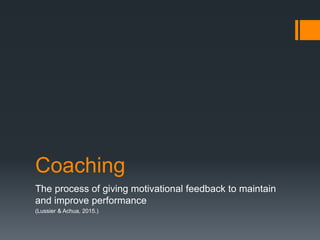
Coaching
- 1. Coaching The process of giving motivational feedback to maintain and improve performance (Lussier & Achua, 2015.)
- 2. Coaching Guidelines Develop a supportive working relationship Give praise and recognition Avoid blame and embarrassment Focus on the behavior, NOT the person Have employees assess their own performance Give specific and descriptive feedback Give coaching feedback Provide modeling and training Make feedback timely, but flexible Don’t criticize
- 3. Develop a supportive working relationship Convey concern for the individuals and your commitment to coaching them to success Ask periodically if there is anything we can do to help them do a better job Remove stumbling blocks for the employee to improve their performance and that of the organization as well.
- 4. Give praise and recognition Giving praise model: Tell the employee exactly what was done correctly Tell the employee why the behavior is important Stop for a moment of silence Encourage repeat performance Lussier & Achua 2015
- 5. Avoid blame and embarrassment Do not focus on placing blame or belittling someone. Effective leaders treat mistakes as learning experiences. During this process employees can stop listening, so be sure to focus on the action, not the person.
- 6. Focus on the behavior, NOT the person Coaching by focusing on changing behavior: I’d like to see what some other members ideas are This is the 6th time you have been late for briefing, we need you hear at the start so everyone can contribute information. Coaching by focusing on the person: You talk to much in debriefing give someone else a change to talk You are always late for everything Why does it always take you forever to turn a report in
- 7. Criticism Self- evaluation Have employees assess their own performance You haven’t been working up to par lately- get on the ball Do you always need help doing something If you don’t know what your doing, don’t do it Hot would you assess your performance over the last few months How are things progressing, is there anything I can do to help. Are there any skills that you would like to work on improving
- 8. Specific feedback Descriptive feedback Give specific and descriptive feedback Giving descriptive and specific feedback avoids confusion on what behavior needs to change Avoid confusion over a particular behavior that needs improvement Should be based on facts or inferences Facts can be proven Inferences cannot
- 9. Give coaching feedback Criticism vs. Feedback The supervisor saw you pick up a box wrong C-you just picked up the box wrong. Don’t let me catch you again F-If you don’t want to injure your back, use your legs-not your back. C- you just wasted a whole day, you need to be organized better F- Next week we can create plan, so that you have a blueprint laid out for the week.
- 10. Provide modeling and training “A good leader leads by example” If the employee sees you doing things in an effective manner, they tend to copy that. Encourage positional growth Match interest with goals and remove roadblocks Introduce extra learning and training opportunities
- 11. Make feedback timely, but flexible Soon as possible after the behavior has been observed. Waiting takes the impact out of the feedback When you don’t have time, set a time Never let emotions take over
- 12. Criticism: once we tell people they are wrong or made a mistake, directly or indirectly four things usually happen 1. They become defensive and justify their behavior or blame it on something or someone 2. They don’t really listen to so-called constructive feedback 3. They are embarrassed and feel bad about themselves- view themselves as losers 4. They begin to dislike the task or job, as well as the critic
- 13. Performance Formula Performance formula explains performance as a function of ability, motivation, and resources. When the employees ability is the reason for keeping performance from being optimal, the corrective coaching action is training When motivation is lacking, coach the employee. Discover what motivates them When resources are the problem, look at getting the needed resources
- 14. Improving Performance with the Coaching Model 1. Describe current performance 2. Describe desired performance 3. Get a commitment to the change 4. Follow up 5. Document + and - feedback
- 15. Example 1 Coaching Scenario #1: Jack is a server in an ice cream shop. The employee knows that the tables should be cleaned up quickly after customers leave so that new customers do not have to sit at dirty tables. It is a busy night and the supervisor finds dirty dishes on two of this employee’s occupied tables. Meanwhile, Jack is socializing with some friends at one of these tables. Because servers are supposed to be friendly, the supervisor suspects Jack will probably use this as an excuse for the dirty tables.
- 16. Quality of Supervision: Questionnaire 1. Do I engaged my staff in the planning process, such as developing work methods and procedures for the job. 2. Do I provide sufficient information on how well my staff is performing. 3. Do I ask my staff for opinions when a work-related problem arises. 4. Do I inform my staff of what my expectations are. 5. Do the standards I use to evaluate my staff’s performance fair and objective.
- 17. QUESTIONS???? Thank You for your time!